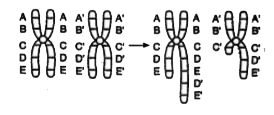If an aberration causes change in the order of genes on a chromosome but does not alter linkage, it is a case of
deletion.
inversion.
translocation.
transposition.
The correct Answer is:B
To answer the question, "If an aberration causes change in the order of genes on a chromosome but does not alter linkage, it is a case of," we need to analyze the concepts involved.
1. Understanding Aberration:
- An aberration refers to a deviation from the normal structure of chromosomes. This can involve changes in the number or structure of chromosomes.
2. Types of Chromosomal Aberrations:
- Chromosomal aberrations can be classified into two main categories: structural and numerical aberrations. Structural aberrations involve changes in the structure of chromosomes, while numerical aberrations involve changes in the number of chromosomes.
3. Change in Gene Order:
- When the order of genes on a chromosome changes, it indicates a rearrangement of the genetic material. This can occur through various mechanisms such as inversions, translocations, or duplications.
4. Linkage:
- Linkage refers to the tendency of genes located close to each other on a chromosome to be inherited together. If the linkage is not altered, it means that the relative positions of the genes that were originally linked remain the same despite the rearrangement.
5. Identifying the Correct Term:
- The scenario described in the question indicates that there is a change in the order of genes but the linkage remains intact. This specific type of chromosomal aberration is known as an inversion. Inversions occur when a segment of a chromosome is reversed end to end, which changes the order of genes but does not affect their linkage.
Conclusion:
The answer to the question is that the aberration causing a change in the order of genes on a chromosome without altering linkage is a case of inversion.
---
- An aberration refers to a deviation from the normal structure of chromosomes. This can involve changes in the number or structure of chromosomes.
- Chromosomal aberrations can be classified into two main categories: structural and numerical aberrations. Structural aberrations involve changes in the structure of chromosomes, while numerical aberrations involve changes in the number of chromosomes.
- When the order of genes on a chromosome changes, it indicates a rearrangement of the genetic material. This can occur through various mechanisms such as inversions, translocations, or duplications.
- Linkage refers to the tendency of genes located close to each other on a chromosome to be inherited together. If the linkage is not altered, it means that the relative positions of the genes that were originally linked remain the same despite the rearrangement.
- The scenario described in the question indicates that there is a change in the order of genes but the linkage remains intact. This specific type of chromosomal aberration is known as an inversion. Inversions occur when a segment of a chromosome is reversed end to end, which changes the order of genes but does not affect their linkage.
The answer to the question is that the aberration causing a change in the order of genes on a chromosome without altering linkage is a case of inversion.
Similar Questions
Knowledge Check
- Question 1 - Select One
Genes that change their lockation on chromosome are
Asplit genesBDuplicate genesCJumpling genesDPleitropic gense - Question 2 - Select One
Chemical change does not take place in case of
Aformation of manure from leavesBbeating aluminium to make aluminium foilCdigestion of foodDburning of magnesium ribbon in air - Question 3 - Select One
Select the correct statements :-
(A) Mutation causes changes in the genotype and the phenotype of an organism.
(B) Chromosomal aberrations are commonly observed in cancer cells.
(C) Sickle cell anemia is a classical example of point mutation.
(D) Deletions and insertions of base pairs of DNA causes frame shift mutations.AA, B and DBA, B and CCA, C and DDA, B, C and D
The distance between A and B genes is too long on a chromosome, the strength of linkage between them is:
View SolutionIn case of flexible exchange rate, rate of foreign exchange does not change.
View SolutionThe diagram below represents a change that occured in a pair of chromosomes during the formation of an egg cell. The letters represent genes on the pair of chromosomes.

The alteration that occured will most likelyView SolutionThe mechanism that causes a gene to move from one linkage group to another is called
View SolutionWhich pair of diseases are caused by genes lacated on X- chromosomes
View Solution

